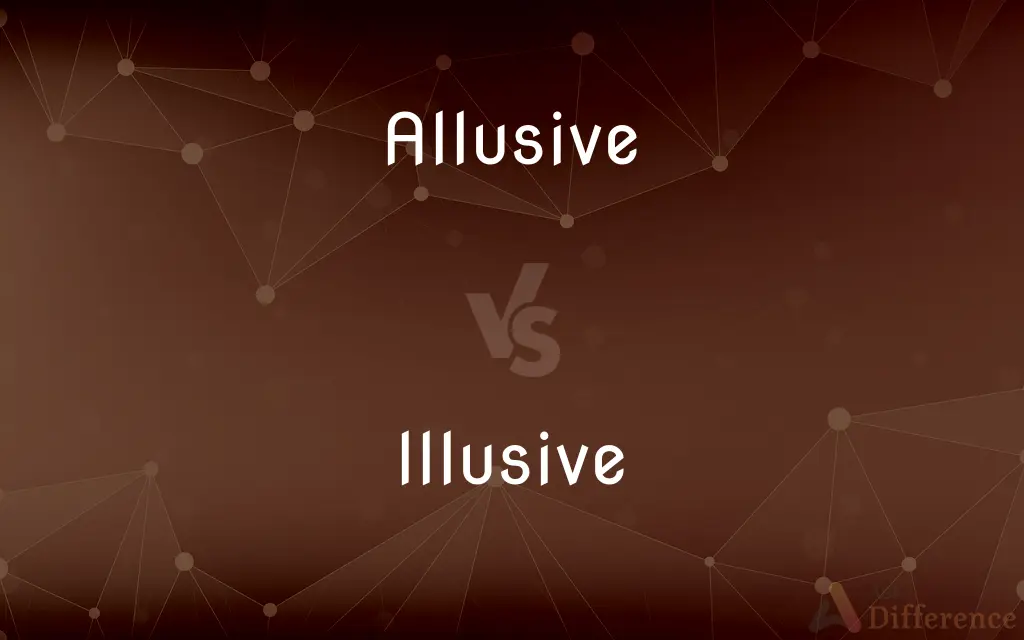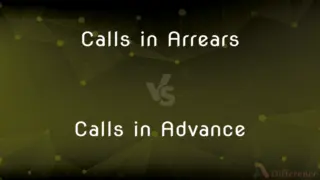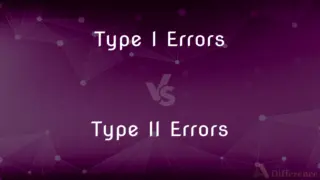Allusive vs. Illusive — What's the Difference?
Edited by Tayyaba Rehman — By Fiza Rafique — Published on December 22, 2023
"Allusive" refers to making indirect references, while "Illusive" describes something deceptive or not based in reality.

Difference Between Allusive and Illusive
Table of Contents
ADVERTISEMENT
Key Differences
"Allusive" is an adjective that primarily pertains to the act of making indirect references or suggestions. For instance, a comment might be allusive if it subtly hints at something without stating it outright. On the other hand, "Illusive" directly relates to something that is illusionary or not based in reality. It's used to describe things that can deceive or mislead one's perceptions.
Using "Allusive" can enrich a conversation or a piece of writing, giving depth by hinting at other concepts or ideas without explicitly stating them. This indirect referencing can often engage the audience more deeply, encouraging them to draw upon their own knowledge or experiences. In contrast, "Illusive" emphasizes the illusory or deceptive nature of something. Whether it's a mirage in a desert or a promise that's too good to be true, if it seems real but isn't, it's illusive.
The nuances between "Allusive" and "Illusive" are subtle, yet the meanings they convey are quite distinct. Being allusive in speech might mean you're hinting at something or referencing it indirectly. Conversely, if someone describes a dream as illusive, they're highlighting its fleeting, unreal nature. In essence, while "Allusive" navigates the realm of indirect references, "Illusive" dwells in the world of deceiving appearances.
Both words, "Allusive" and "Illusive," stem from different roots, with the former coming from the idea of playing or jesting and the latter from the realm of illusions. Thus, while they may sound similar, their origins and meanings make them distinct in usage. Recognizing the differences between these terms ensures clarity in communication, allowing for the precise conveyance of ideas.
Comparison Chart
Primary Meaning
Making indirect references
Deceptive or not real
ADVERTISEMENT
Usage
In referencing or hinting
Describing deceptive things
Root Origin
From the idea of playing/jesting
From the realm of illusions
Example Concept
Hinting at a topic
A mirage in the desert
In Literature
Subtle references to other works
Descriptions of dreamlike states
Compare with Definitions
Allusive
Allusive can mean making a casual or indirect reference to something.
The poem was deeply allusive, drawing on various cultural references.
Illusive
Illusive describes something that deceives or misleads.
The oasis in the desert was illusive, merely a mirage.
Allusive
Allusive involves a subtle or indirect mention or hint.
The author's allusive style requires readers to be well-versed in literature.
Illusive
Illusive is often used to describe fleeting, unreal phenomena.
The hopes of winning were illusive, vanishing quickly.
Allusive
Allusive tends to indirectly call attention to something.
The song's allusive lyrics made fans speculate about its true meaning.
Illusive
Illusive pertains to producing illusions.
His promises turned out to be illusive and untrustworthy.
Allusive
Allusive is hinting at or suggesting something indirectly.
His comment was allusive to the previous incident.
Illusive
Illusive means not based in reality or actuality.
The dream was so vivid, yet it was merely illusive.
Allusive
Allusive pertains to the act of alluding or making hints.
Her allusive remarks left everyone pondering her real intent.
Illusive
Illusive refers to something with a deceptive appearance.
The illusive shimmer on the horizon disappeared as we approached.
Allusive
Containing or characterized by indirect references
An allusive speech.
Illusive
Illusory.
Allusive
That contains or makes use of allusions (indirect references or hints)
Illusive
Subject to or pertaining to an illusion, often used in the sense of an unrealistic expectation or an unreachable goal or outcome.
Testing software completely is an illusive goal.
Allusive
Figurative; symbolical.
Illusive
Deceiving by false show; deceitful; deceptive; false; illusory; unreal.
Truth from illusive falsehood to command.
Allusive
Having reference to something not fully expressed; containing an allusion.
Illusive
Based on or having the nature of an illusion;
Illusive hopes of of finding a better job
Secret activities offer presidents the alluring but often illusory promise that they can achieve foreign policy goals without the bothersome debate and open decision that are staples of democracy
Allusive
Characterized by indirect references;
Allusive speech is characterized by allusions
Common Curiosities
Is being Allusive similar to openly stating something?
No, being Allusive means hinting at or suggesting something indirectly, not stating it outright.
Can Illusive be used to describe a dream?
Yes, Illusive can describe a dream, emphasizing its unreal or deceptive nature.
Can an Allusive comment be clear to everyone?
Not necessarily. An Allusive comment often requires the listener or reader to draw upon their own knowledge or experiences.
Are Allusive and Illusive synonyms?
No, despite sounding similar, they have different meanings.
Can a piece of art be Illusive?
Yes, if the art gives a deceptive appearance or creates an illusion, it can be described as Illusive.
Is being Allusive a direct way of conveying information?
No, being Allusive is an indirect way of suggesting or hinting at information.
Can a statement be both Allusive and Illusive?
Theoretically, yes. A statement can hint at something (Allusive) while also being deceptive (Illusive).
What does Allusive mean in literature?
In literature, Allusive refers to making indirect references or hints to other works, events, or ideas.
How do Allusive and Illusive differ in meaning?
While Allusive refers to indirect references, Illusive relates to something deceptive or not real.
Which term, Allusive or Illusive, is related to illusions?
Illusive is related to illusions.
Is Allusive always a subtle form of communication?
Typically, yes. Allusive communication often requires inference by the listener or reader.
What's a common scenario where Illusive might be used?
Describing a mirage in a desert as it appears real but isn't.
Does Illusive always indicate deception with negative intent?
No, Illusive simply describes something as not being real or as it appears, without necessarily implying malicious intent.
Can Illusive relate to tangible objects?
Yes, if the object appears differently than its true nature or is deceptive in its appearance.
What kind of appearance might be described as Illusive?
Appearances that deceive the senses, like optical illusions or mirages.
Share Your Discovery

Previous Comparison
Calls in Arrears vs. Calls in Advance
Next Comparison
Type I Errors vs. Type II ErrorsAuthor Spotlight
Written by
Fiza RafiqueFiza Rafique is a skilled content writer at AskDifference.com, where she meticulously refines and enhances written pieces. Drawing from her vast editorial expertise, Fiza ensures clarity, accuracy, and precision in every article. Passionate about language, she continually seeks to elevate the quality of content for readers worldwide.
Edited by
Tayyaba RehmanTayyaba Rehman is a distinguished writer, currently serving as a primary contributor to askdifference.com. As a researcher in semantics and etymology, Tayyaba's passion for the complexity of languages and their distinctions has found a perfect home on the platform. Tayyaba delves into the intricacies of language, distinguishing between commonly confused words and phrases, thereby providing clarity for readers worldwide.












































